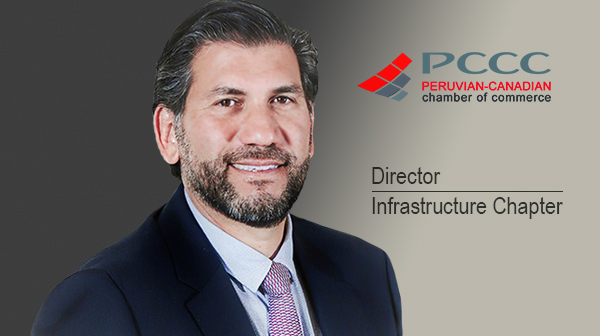Infrastructure Chapter – New Challenges

I greet you on the creation of the Infrastructure Chapter of the Peruvian Canadian Chamber of Commerce (PCCC).
It is an honor for me to address you on behalf of the Chamber, to share our purpose of organizing a set of activities and initiatives aimed at collaborating with the development of infrastructure in our country.
In this sense, the creation of the Infrastructure Chapter, which I have been charged with organizing and directing, has an important task ahead of it and of assistance with Peru.
It is a challenge and a commitment that the reality of the times encourages and drives. We intend to be spokespersons for ideas and proposals, as well as for new technological orientations that promote the development of this sector.
Peru needs to have infrastructure that contributes to internal and external strengthening, to the development of logistics corridors, to the process of land use planning, protection of the environment, and to improve the level of competitiveness of the economy; have safe, efficient and quality transport services: expand the coverage of its telecommunications services; as well as achieving the commitment of private investment; actively and firmly develop decentralization, and also count on incorporating modern and updated organizational structures and regulations.
In accordance with my experience and commitment, I am in a position to affirm that given the inefficiency of the traditional public procurement model in Peru and the lack of confidence in its own institutions, it is vital to continue promoting mechanisms for the execution of works that involve the signing of international contracts within successful formats such as Government to Government Agreements.
These innovative models are precisely what become an efficient alternative to choose national and foreign construction companies and accompany them during the execution. This ensures that deadlines and budgets are met.
I believe that the Covid19 health crisis showed us the extremely high cost to society, of not executing the works within the established deadlines or having them paralyzed due to arbitrations or endless trials, it is essential to strategically promote the execution of works, but also the provision of services that aspire to improve the quality of life of the neediest citizens.
Faced with this, Canada offers extensive experience and knowledge of the Construction and Engineering sector that it is necessary to contemplate with interest, given the existing needs in Peru. It is, therefore, very necessary to develop a positioning strategy to make these capacities known and we at the PCCC want to contribute to this.
But it is not only this set of ideas and pending tasks that brings us together today. On July 1, Canada Day was celebrated, and it was certainly a cause for rejoicing, but also for reflection on its history, past, and especially future.
Canada means a new milestone in our personal and professional lives that gains, more and more, a place in our feelings, for the security and opportunities with which it surrounds us.
This month does not only mean a celebration for Canada, but this July 28, we will contemplate two hundred years of Peru’s history. This bicentennial means many good things, but also many aspects pending improvement in this long history. Comings and goings, marches and setbacks, expectations and disappointments that have marked the dream and hope of a country.
Today, above all that, from the Peruvian Canadian Chamber of Commerce, we want to reaffirm our responsibility to reciprocally promote the development of trade opportunities between Peru and Canada. We are very excited because we are about to celebrate a friendship, which by the way this October 21 celebrates 77 years of diplomatic relations.
Long live Peru, long live Canada!
Luis Felipe Quiros
Director Infrastructure Chapter
Canadian Peruvian Chamber of Commerce
Toronto, Canada



